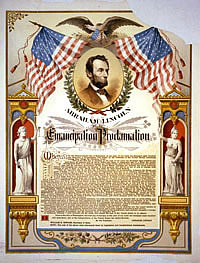The emancipation proclamation was issued by Abraham Lincoln on January 1, 1863, during the American Civil War, declaring all “slaves within any State, or designated part of a State… then… in rebellion,… shall be then, thenceforward, and forever free.” The states affected were enumerated in the proclamation; specifically exempted were slaves in parts of the South then held by Union armies. Lincoln’s issuance of the Emancipation Proclamation marked a radical change in his policy.
After outbreak of the Civil War, the slavery issue was made acute by the flight to Union lines of large numbers of slaves who volunteered to fight for their freedom and that of their fellow slaves. In these circumstances, a strict application of established policy would have required return of fugitive slaves to their masters.
Abolitionists had long been urging Lincoln to free all slaves, and public opinion supported that view. Lincoln moved slowly and cautiously  none the less; on March 13, 1862, the federal government forbade all Union Army officers to return fugitive slaves, thus annulling in effect the fugitive slave laws. On April 10, on Lincoln’s initiative, congress declared the federal government would compensate slave owners who freed their slaves. All slaves in the District of Columbia were freed in this way on April 16, 1862. On June 19, 1862, Congress enacted a measure prohibiting slavery in United States territories, thus defying the Supreme Court decision in the Dred Scott case, which ruled that Congress was powerless to regulate slavery in the territories.
none the less; on March 13, 1862, the federal government forbade all Union Army officers to return fugitive slaves, thus annulling in effect the fugitive slave laws. On April 10, on Lincoln’s initiative, congress declared the federal government would compensate slave owners who freed their slaves. All slaves in the District of Columbia were freed in this way on April 16, 1862. On June 19, 1862, Congress enacted a measure prohibiting slavery in United States territories, thus defying the Supreme Court decision in the Dred Scott case, which ruled that Congress was powerless to regulate slavery in the territories.
Finally, after the union victory in the battle of Antietam, Lincoln issued a preliminary proclamation on September 22, declaring his intention of promulgating another proclamation in 100 days, freeing the slaves in the states deemed in rebellion at that time. On January 1, 1863 he issued the Emancipation proclamation, conferring liberty on about 3,120,000 slaves. With the enactment of the 13th amendment to the U.S. Constitution in effect in 1865, slavery was completely abolished.
The results of the Emancipation Proclamation were far-reaching. From then on, sympathy with the Confederacy was identified with support of slavery.
